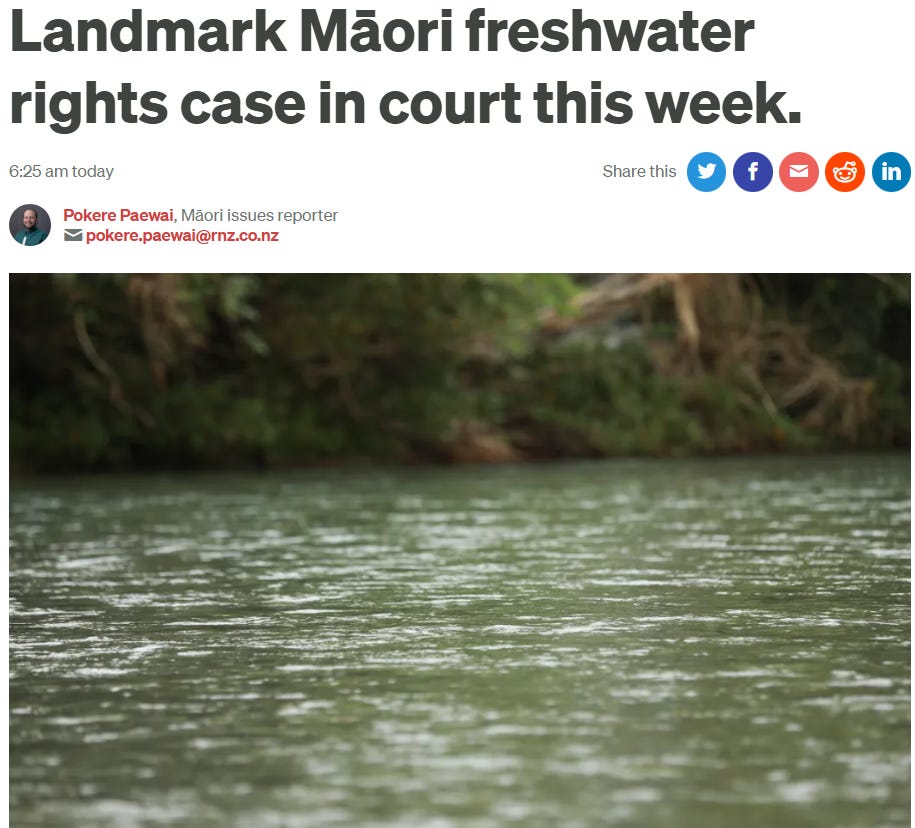The latest High Court case over Māori freshwater rights is being hailed as “landmark” by some. Peel back the layers, and what we’re really seeing is the definition of modern-day racism - a race claiming exclusive control over a resource that belongs to everyone.
Water is life. It sustains us all, Māori and European Kiwi’s alike. However in 2025, a coalition of iwi collectives and Māori landowner organisations is arguing that because of their ancestry, they should have special authority over New Zealand’s freshwater. Never mind the fact that most of the population has no say. Never mind that everyday Māori, those struggling to pay rent, heat their homes, and put kai on the table, will not see a cent of any benefit.

Wai Mana Whenua Chairman Kingi Smiler
This is not about environmental protection, no matter how many korowais they dress it up in. It is a grift. The elite Māori at the top of the pyramid, the ones who run the trusts and control the land, are lining themselves up for profit and power, while the ordinary folk remain sidelined. A few powerful iwi leaders like Kingi Smiler above get legal fees, influence, and control over water allocation. The rest of us watch as our water becomes a political pawn.

Racism is not always about hatred; sometimes it is about entitlement. In this case, the entitlement is clear that a race claiming exclusive rights over a shared resource. It is privilege masquerading as justice, with the backing of a legal system that continues to pander to identity politics.
The irony is staggering. The argument is framed as protecting Māori tikanga and fulfilling Treaty obligations, yet in practice, it will likely exacerbate inequality within Māori communities. Those not connected to the right iwi structures are left out. Those without land or status gain nothing. Meanwhile, the elite sit at the top, bank accounts bulging, moral righteousness intact.
Water should not have a racial price tag. It belongs to every New Zealander. To allow one group to claim it as theirs, while others, including many Māori, remain on the margins, is not justice. It is discrimination. It is elitism. It is exactly the kind of race-based entitlement that divides a country and undermines fairness.
When the court hands down its decision, it should remember this simple truth that the people of New Zealand, not the elite few, own our rivers, lakes, and streams. Anything less is a betrayal, not just of law, but of common sense.
Matua Kahurangi is just a bloke sharing thoughts on New Zealand and the world beyond. No fluff, just honest takes. He blogs on https://matuakahurangi.com/ where this article was sourced.


7 comments:
Couldn’t agree more, but until Luxon comes out strong, and states unequivocally that Parliament is the ultimate decision maker, Māori elites will continue with their push for a Māori led NZ, at the expense of all others.
I say give them authority of water, but they are responsible for any damage that water does.
At a book titled Forbidden History, by John Aldworth, launched about 10 years ago in Dargaville, a woman of the Patupaiarehe people said that she made a speech in which she said that while addressing the Waitangi Tribunal, she was told to sit dawn and be quiet because she was extinct. What gross effrontery! The Patupaiarehe arrived here at about the time of the birth of Jesus Christ, the year 1. That is about 1200 years before maori elitists! Following them were Waitaha and Moriori. If the court finds that the elitists own fresh water, it will be a great disservice to the other New Zealanders.
Kevan
Water comes here from all over the world mainly to the west and departs here mainly to the East. No one owns any of it.
Googled "Patupaiarehe people" and got the following:
>"Patupaiarehe are supernatural, fairy-like beings from Māori tradition who live in forests and on misty mountaintops. They are described as having light skin, fair or red hair, and are considered highly tapu (sacred). While they are mostly seen as mysterious and elusive, their presence is sometimes indicated by the sounds of their flutes and singing, particularly during the twilight hours or in heavy mist."
Not exactly "people", huh..........
But I suppose if rivers and mountains can have legal personalities then so can fairies. I wonder when we see them being awarded rights by some statute..............
I wonder if there is not a molecule of water in the World that has not passed through at least one human or animal at some time or other, even that frozen solid at the Poles since these have moved over time? The arrogance of those who claim ownership over water is astounding. My point? It is a universally shared resource, so tell them all to beggar off!
When rivers overflow their banks,when destructive rain causes economic damage, are Maori putting up their hands, apologizing for the damage by their water, and offering compensation ?
Nah, with Maori, money only flows into their hands, not out.
Simply more Maori hypocrisy.
Post a Comment
Thank you for joining the discussion. Breaking Views welcomes respectful contributions that enrich the debate. Please ensure your comments are not defamatory, derogatory or disruptive. We appreciate your cooperation.